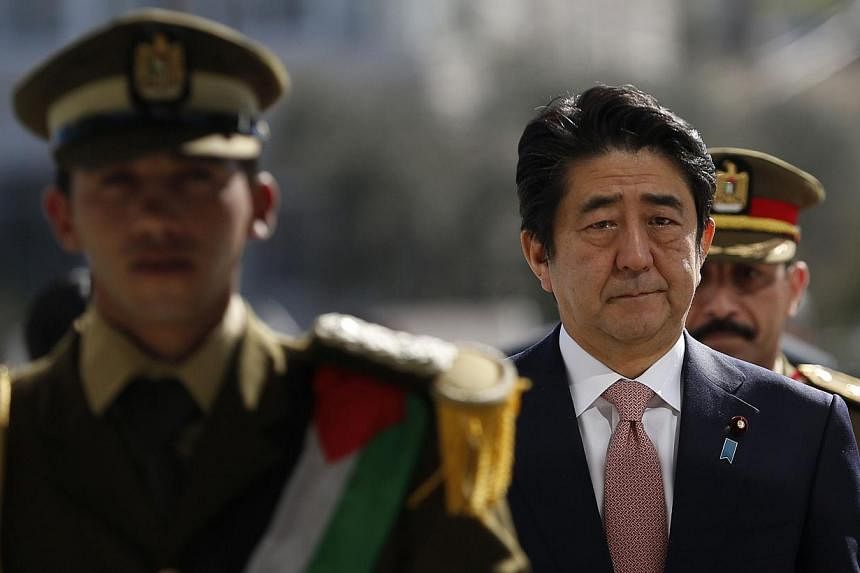TOKYO (AFP) - Japanese Prime Minister Shinzo Abe was rushing home from the Middle East Wednesday to take charge of Tokyo's response after Islamic militants threatened to kill two nationals unless he pays a US$200 million (S$ 266 million) ransom.
A defiant Mr Abe vowed he would not bow to "terrorism" as Japan was thrust abruptly into the conflict gripping Syria and Iraq, where extremists have seized control of large areas.
"I strongly demand that they not be harmed and that they be immediately released," he told a news conference in Jerusalem. "The international community will not give in to terrorism and we have to make sure that we work together."
The self-styled Islamic State in Iraq and Syria (ISIS) group has murdered five Western hostages since August last year, but this is the first time the jihadist group has threatened Japanese captives.
In footage posted on jihadist websites, a black-clad militant brandishing a knife addresses the camera in English, standing between two hostages wearing orange jumpsuits.
"You now have 72 hours to pressure your government into making a wise decision by paying the US$200 million to save the lives of your citizens," he says.
The militant says that the ransom sum is equal to the aid that Abe pledged in support of the fight against ISIS.
Japan has repeatedly insisted it has offered non-military assistance for countries affected by the ISIS group's bloody expansion in Iraq and Syria, which has spurred an exodus of refugees to neighbouring countries.
Supportive voices came from around the world, with US Secretary of State John Kerry telling his Japanese counterpart Fumio Kishida that Washington stood firmly behind Tokyo.
Japan, a constitutionally pacifist country has steered clear of the armed entanglements of the US, Britain and other Western nations in the Middle East.
The ensnarement of two of its citizens in the IS group's bloody ideological battle is deeply shocking to Japan, and there is likely to be considerable domestic pressure on Mr Abe to try to negotiate their release.
The video of a militant with a British accent brandishing a knife over the heads of journalist Kenji Goto and self-employed military contractor Haruna Yukawa looped on television Tuesday as the news broke.
Wednesday's newspapers gave it blanket coverage, while talk shows and news programmes were dominated by the issue, with much speculation on the authenticity of the video.
Film editor Genta Tamaki noted apparent discrepancies in the shadows cast by the hostages, which he said could indicate images of the two men had been inserted into the desert footage.
"In principle, these shadows do not look as one might expect in sunlight," he was quoted as saying.
This might occur if filming was done indoors using several lights and combined with the background later, he said, although he added it was not possible to be certain.
Outlets also noted clothes worn by Yukawa moved more than those Goto was wearing, and neither man flinched when their captor waved his knife near them.
Chief Cabinet Secretary Yoshihide Suga, said experts had examined the footage. He did not address the speculation, but said the Japanese government was assured of the identity of the men.

